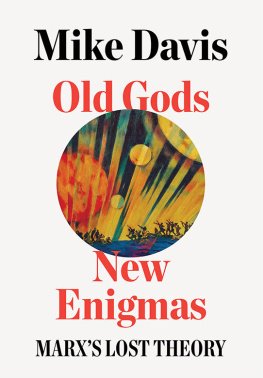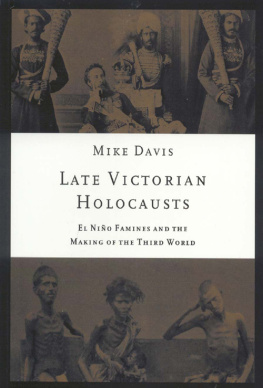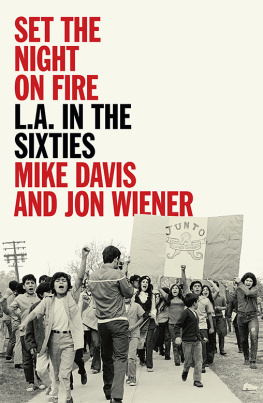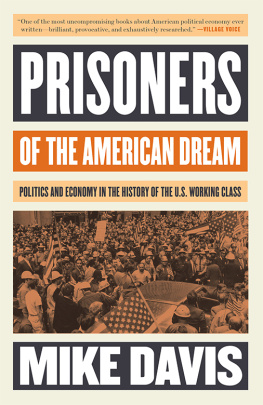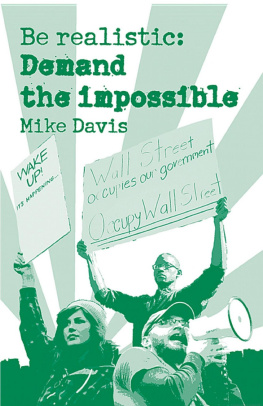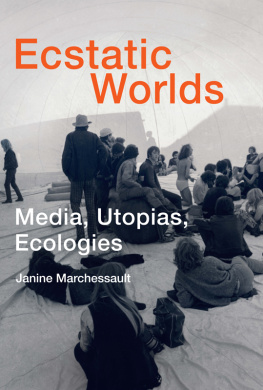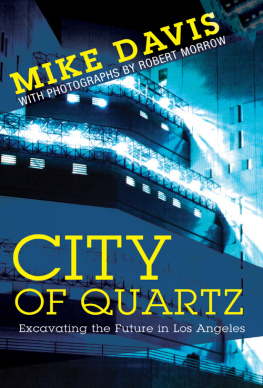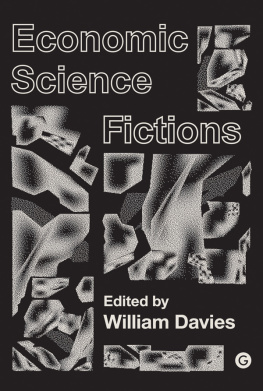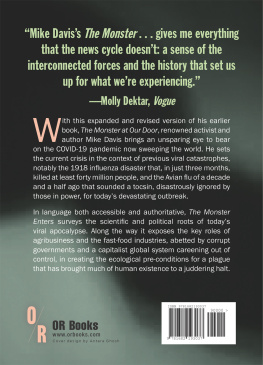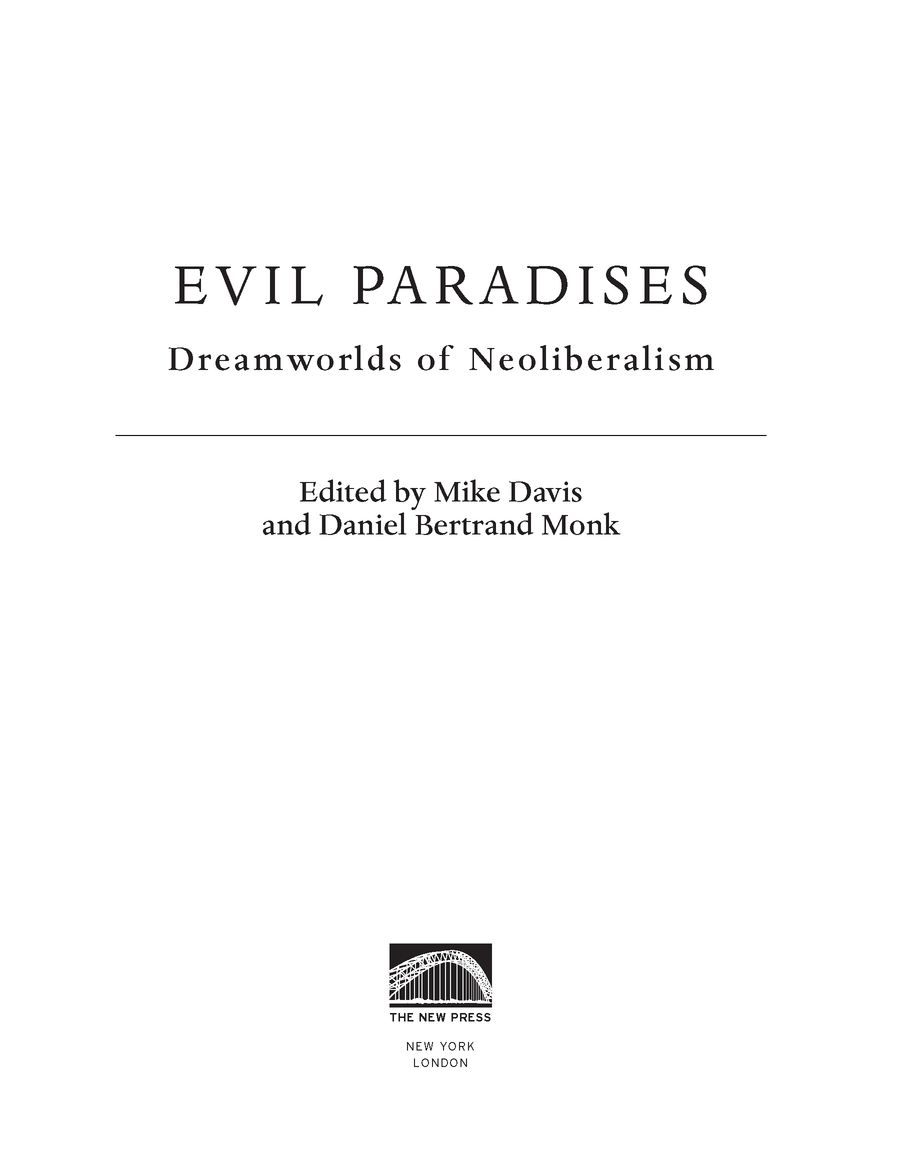Table of Contents
Also by Mike Davis from The New Press
The Monster at Our Door
Under the Perfect Sun
(with Jim Miller and Kelly Mayhew)
Dead Cities

Evil Paradises revisits, now on a global canvas, many of the concerns of Variations on a Theme Park, the prophetic 1991 symposium on the future of American urbanism edited and inspired by Michael Sorkin. As practicing architect, critic, and theorist, Sorkin has become the most seminal, consistently creative presence in the contemporary urban studies scene. His twenty or so books (published or in press) include some of the toughest-minded architectural criticism ever written (Exquisite Corpses) as well as radical exposs of the politics of walls, borders, globalization, 9/11 monuments, and architectural counterterrorism (Giving Ground, Against the Wall, After the World Trade Center, and Indefensible Space). But Sorkin also sustains the utopian spirit in contemporary urban design, exploring the ecologies of communal self-organization (Local Code) and proposing breathtaking schemes for sustainable cities (Eutopia and the forthcoming New York City [Steady] State). He refreshes his extraordinary vision of global urbanism with constant fieldwork: Kumasi, Hanoi, Vienna, Johannesburg, Bangalore, Abu Dhabi, Taiwan, Jerusalem, and, most recently, New Orleans. Yetas director of the Urban Design Program at City College of New York Graduate Centerhe remains a militant New Yorker, deeply involved in local struggles for social justice and affordable housing.
The editors accumulated debts to Sorkins intellectual generosity exceed any simple accounting. All the greater, then, the pleasure we take in dedicating Evil Paradises to our gadfly, comrade, and chief instigator.
April 2007
Introduction
A Brechtian maxim: take your cue not from the good old things, but from the bad new ones.
Walter Benjamin, diary entries, 1938
Evil Paradises addresses a simple but epochal question: Toward what kind of future are we being led by savage, fanatical capitalism? Or, to frame the same question in a different way, What do contemporary dreamworlds of consumption, property, and power tell us about the fate of human solidarity? These case studies explore the new geographies of exclusion and landscapes of wealth that have arisen during the long globalization boom since 1991. We focus, especially, on those instancesranging from Arizona to Afghanistanwhere the Atlas Shrugged, winner-take-all ethos is unfettered by any remnant of social contract and undisturbed by any ghost of the labor movement, where the rich can walk like gods in the nightmare gardens of their deepest and most secret desires.
Such places are now surprisingly common (if you can pay the membership fee), and utopian greedshades of Paris Hilton, Bernie Ebbers, and Donald Trumpsaturates popular culture and the electronic media. No one is surprised to read about millionaires spending $50,000 to clone their pet cats or a billionaire who pays $20 million for a brief vacation in space. And if a London hairdresser has clients happy to spend $1,500 for haircuts, then why shouldnt a beach house in the Hamptons sell for $90 million or Lawrence Ellison, CEO of Oracle, earn $340,000 an hour in 2001? Indeed, so much hyperbole is depleted in the coverage of the lifestyles of billionaires and celebrities that little awe remains to greet the truly extraordinary statistics, like the recent disclosure that the richest 1 percent of Americans spend as much as the poorest 60 million; or that 22 million factory jobs in the twenty major economies were sacrificed to the gods of globalization between 1995 and 2002; or that rich individuals currently shelter a staggering $11.5 trillion (ten times the annual GDP of the UK) in offshore tax havens.
It is now customary, except perhaps in the pages of the Wall Street Journal, to refer to this new and greatest gilded agethe outgrowth of the global counterrevolution against social citizenship unleashed by Margaret Thatcher, Ronald Reagan, and Deng Xiaoping in the early 1980s, and continued by Tony Blair, Bill Clinton, Boris Yeltsin, and Li Peng during the 1990sas the reign of neoliberalism. Resurgent late capitalism, we are told, has succeeded, where all the great world religions have failed in finally unifying all of humanity in a single imaginary body: the global marketplace. History ends and the realm of (personal, not collective) freedom beginsor does it? Neoliberalism, as Pierre Bourdieu eloquently warned us, is actually an authoritarian utopia that is nothing less than a program of the methodical destruction of collectives, from trade unions and mill towns to families and small nations.
Further, as Timothy Mitchell shows in the stunning essay on Egypts supposed free-market miracle that opens this volume, the hegemony of neoliberal policies has little to do with self-regulating markets, supply and demand, or even the economic as an autonomous category. Neoliberalism is not the
Wealth of Nations 2.0; nor is it latter-day Cobdenism, healing the worlds wounds through peaceful free trade; and, most certainly, it isnt the advent of the stateless market utopia romanticized by Friedrich von Hayek and Robert Nozick. On the contrary, what has characterized the long boom since 1991 (or 1981, if you prefer) has been the massive, naked application of state power to raise the rate of profit for crony groups, billionaire gangsters, and the rich in general. As one of us wrote about Reagans economic program more than a generation ago:
Although the rhetoric of the various campaigns and tax rebellions that paved Reagans road to power was vigorously anti-statist, the real programmatic intention was towards a restructuring, rather than diminution, of state spending and intervention in order to expand the frontiers of entrepreneurial and rentier opportunity. Typical explicit or underlying demands included: accelerated depreciation allowances, unfettered speculative real estate markets and rampant condominiumization, subcontracting of public services, transfer of tax resources from public to private education, lowering of minimum wages, abolition of health and safety standards for small businesses, and so on.
The central role of state power, rather than free markets, in the neoliberal program ironically finds its most dramatic expression in the massive privatization of public assets, the subcontracting of public employment (which now includes even the waging of war), and the deregulation of financial markets. Economic textbooks can drone on forever about profit-driven technological innovation and the invisible hand of trade, but, as David Harvey has rightly insisted, the main achievements of neoliberalism have been redistributive rather than generative. It has been corrupt insider political power, nothing less, that has given away the global commons to a plunderbund that includes Dick Cheneys Halliburton, Boeing, Blackwater, Carlos Slims Telmex, Yukos, the Abramovich empire, Larry Rong Zhijians China International Tourist and Investment Corporation, Silvio Berlusconis Fininvest, and Rupert Murdochs News Corporation. This cold fusion of crime, dirty politics, and capital is fittingly celebrated in the rise of such former mob hideouts as Dubai, Las Vegas, Miami, and even Medelln (see Forrest Hyltons essay) as global icons of the new capitalism.



